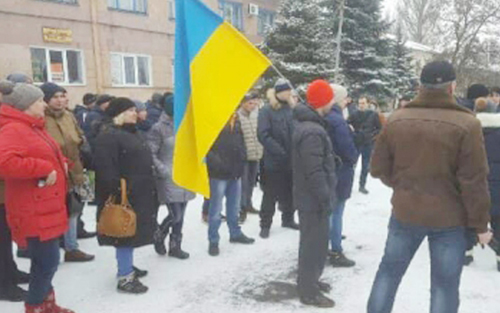Wage arrears owed to working people in Ukraine reached a staggering 2.37 billion hryvnia ($88 million) as of Jan. 1, a 33 percent increase over the past year. About 80 percent is owed to workers in the mining and heavy industry sectors, and nearly half affects the Ukraine government-controlled parts of Donetsk and Luhansk.
On Feb. 14 workers in four Donetsk mines, part of the state-owned Selydivvuhillia complex, had enough and a big majority of the 10,000 working there walked out. Miners at the Novogrodivka mine set up round-the-clock picketing, stopping anybody from crossing the line. Similar protests took place at the other three mines. After two days of the strike, the government transferred 365 million hryvnia of the 945 million hryvnia owed to workers to state coal enterprises, 90 million of which was earmarked for the Donetsk mines.
“We were given part of our money, but it’s just throwing dust in our eyes,” 35-year-old miner Sergei Durov told ChannelNewsAsia on the picket line in Novogrodivka. He explained how the government bosses try to keep all information about the mine secret. “Nobody knows who we sell our coal to, everything is surrounded by mystery,” he said.
The Moscow-backed separatist war launched against Ukraine after the popular Maidan protests overthrew President Viktor Yanukovych in 2014 has meant many of the settlements in mine areas have been bombed, and many businesses shut down. “We have no other jobs. If our mines are closed, the towns are simply going to die,” miner Leonid Shebanov said. “We are here to draw the attention of politicians to our situation.”
These actions followed a series of strikes last year throughout Ukraine, including shipyard workers in Mykolayiv, coal miners in Lviv and Volyn, and iron ore miners in the Dnepropetrovsk region, demanding payment of back wages, raises and improved working conditions.
Workers at the four mines in Donetsk — Novogrodivka, Kotlyarevskoho, Kurakhivka and Ukraina — sent a delegation of nine members and leaders of the Independent Trade Union of Miners of Ukraine to Kiev, the capital, to meet with the government and demand payment of all arrears. When the government refused to pay any more, the delegation staged a sit-in and hunger strike at the Ministry of the Energy and Coal Industry. After nine days, when a number of the miners got ill, they decided to end the hunger strike March 1.
“Our struggle was for miners’ rights and for justice,” Sergei Pavlov, one of the nine unionists, said in statement. “We’ve attracted attention to the problems of miners and state enterprises.”


